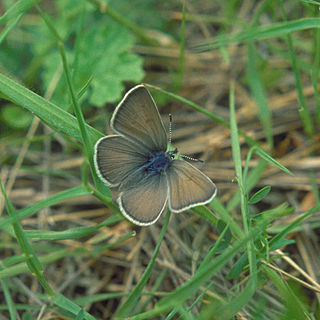
Papilio is a genus in the swallowtail butterfly family, Papilionidae, as well as the only representative of the tribe Papilionini. The word papilio is Latin for butterfly.

Jean Baptiste Alphonse Déchauffour de Boisduval was a French lepidopterist, botanist, and physician.

Noctuoidea is the superfamily of noctuid or "owlet" moths, and has more than 70,000 described species, the largest number of any Lepidopteran superfamily. Its classification has not yet reached a satisfactory or stable state. Since the end of the 20th century, increasing availability of molecular phylogenetic data for this hugely successful radiation has led to several competing proposals for a taxonomic arrangement that correctly represents the relationships between the major lineages.

Fender's blue butterfly is an endangered subspecies of Boisduval's blue endemic to the Willamette Valley of northwestern Oregon, United States. The potential range of the butterfly extends from south and west of Portland, OR to south of Eugene, OR. The butterfly is host-specific on the Kincaid's lupine, which it relies on for reproduction and growth.

Eurema is a widespread genus of grass yellow butterflies in the family Pieridae.

The Calpinae are a subfamily of moths in the family Erebidae described by Jean Baptiste Boisduval in 1840. This subfamily includes many species of moths that have a pointed and barbed proboscis adapted to piercing the skins of fruit to feed on juice, and in the case of the several Calyptra species of vampire moths, to piercing the skins of mammals to feed on blood. The subfamily contains some large moths with wingspans longer than 5 cm (2 in).

Glaucopsyche, commonly called blues, is a Holarctic genus of butterfly in the family Lycaenidae, found mainly in Palearctic Asia. For other species called "blues" see subfamily Polyommatinae and genus Plebejus.

Speyeria, commonly known as greater fritillaries, is a genus of butterflies in the family Nymphalidae commonly found in North America, Europe, and Asia. Some authors used to consider this taxon a subgenus of Argynnis, but it has been reestablished as a separate genus in 2017.

Rhynchium is an Australian, Afrotropical, Indomalayan and Palearctic genus of potter wasps.

Icaricia icarioides, or Boisduval's blue, is a butterfly of the family Lycaenidae found in North America. This butterfly has 25 recognized subspecies.

Icaricia lupini, the lupine blue, is a butterfly of the family Lycaenidae. It is found from south-western Canada, south through much of mountainous and intermountain western United States and high plains to northern Mexico.

Icaricia icarioides blackmorei, the Puget blue, is a butterfly native to the Puget Sound area in the northwestern U.S. state of Washington. It is a subspecies of Boisduval's blue.

Satyrium semiluna, known generally as the sagebrush sooty hairstreak or half-moon hairstreak, is a species of hairstreak in the butterfly family Lycaenidae. It is found in North America. The MONA or Hodges number for Satyrium semiluna is 4277.1.













